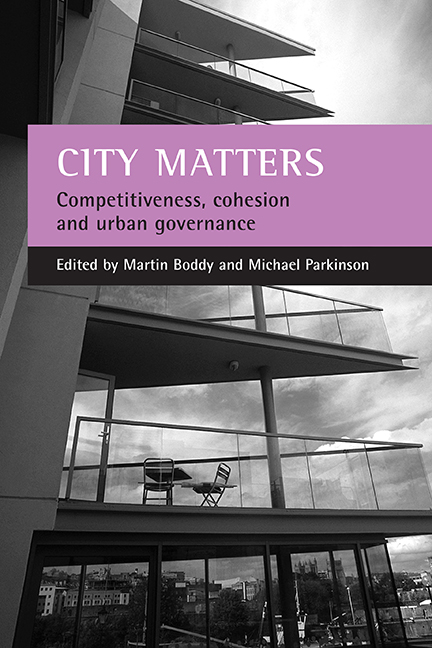Book contents
- Frontmatter
- Contents
- List of tables and figures
- Foreword
- Acknowledgements
- Notes on contributors
- one Introduction
- Part One Competitiveness, cohesion and urban governance
- Part Two Competitiveness and urban change
- Part Three Competitiveness, innovation and the knowledge economy
- Part Four Housing, property and economic performance
- Part Five Space, place and social cohesion
- Part Six Ethnicity, enterprise and social cohesion
- Part Seven Leadership, governance and social capital
- Conclusions
- Index
twenty - ‘Pathways to integration’: tackling social exclusion on Merseyside
Published online by Cambridge University Press: 20 January 2022
- Frontmatter
- Contents
- List of tables and figures
- Foreword
- Acknowledgements
- Notes on contributors
- one Introduction
- Part One Competitiveness, cohesion and urban governance
- Part Two Competitiveness and urban change
- Part Three Competitiveness, innovation and the knowledge economy
- Part Four Housing, property and economic performance
- Part Five Space, place and social cohesion
- Part Six Ethnicity, enterprise and social cohesion
- Part Seven Leadership, governance and social capital
- Conclusions
- Index
Summary
As clearly demonstrated elsewhere in this volume (Chapters Two to Five for example), marked spatial concentration of disadvantage is a significant feature of major urban areas across the UK both prosperous and less buoyant. Problems of social exclusion and a lack of social cohesion persist despite considerable variation in competitive strength. At the same time, as earlier chapters make clear, such problems are particularly intractable in those urban areas where the overall economic context is particularly weak. The research reported here focused on Merseyside, which would fall into this category of less buoyant areas. It focuses more specifically on one particular regeneration initiative being carried out on Merseyside to address issues of social exclusion and concentrated disadvantage. A distinctive feature of this programme was the targeting of a significant tranche of spending on areas of the city-region experiencing particularly marked concentrations of disadvantage. This spending, in the shape of the so-called ‘Pathways to Integration’ priority, was channelled through specially formed partnerships in the targeted areas that were required to involve representation from local residents and community organisations alongside representatives of public agencies, the private sector (where it existed) and voluntary organisations. In the context of the ESRC Cities Research programme, the initiative offered the opportunity to explore the relationship between core research themes – governance, social exclusion/inclusion, participation and social capital – in a major ‘real time’ experiment in partnership working in urban regeneration.
Objective One and Pathways: multi-level social governance?
The research traced the genesis of the Pathways initiative to the negotiations over the Single Programming Document for delivery of the structural funds. It had not featured in the original proposal, Merseyside 2000 (Government Office for Merseyside, 1993), but was promoted by EC officials who had picked up on some of the arguments in the ex ante evaluation of Merseyside 2000 over the relative silence in the original plan on the city-region’s socio-economic geography (Lloyd and Meegan, 1994). The original proposal had made no reference to the marked spatial disparities in industrial development, social and economic well-being and environmental conditions that existed across the city-region. Nor had it made any prior assessment of either the spatial implications of the implementation of the programme as a whole or of the potential spatial impact of its detailed measures.
- Type
- Chapter
- Information
- City MattersCompetitiveness, Cohesion and Urban Governance, pp. 367 - 388Publisher: Bristol University PressPrint publication year: 2004



